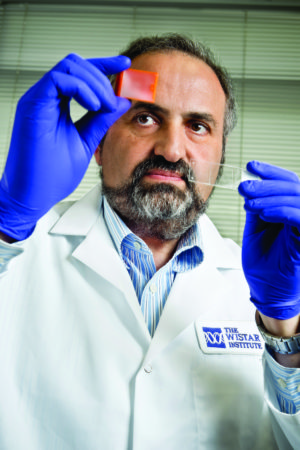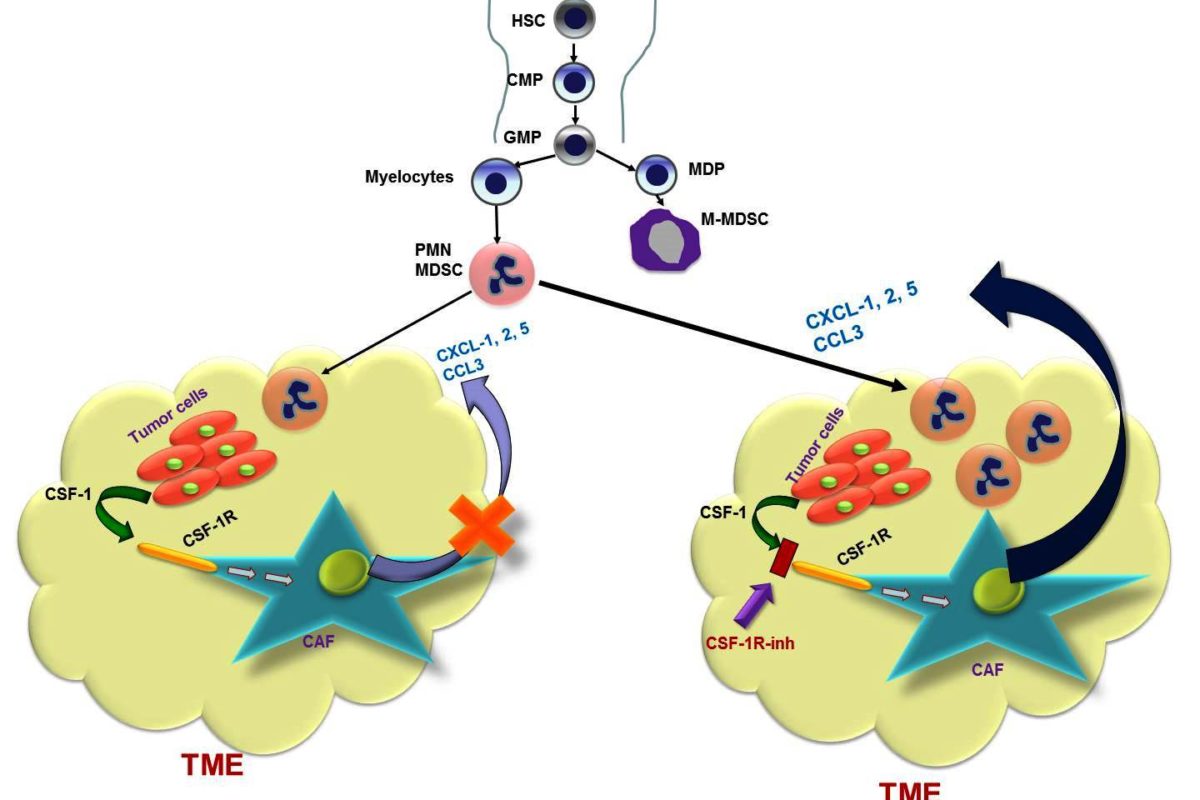Medical and surgical oncologists at Christiana Care’s Helen F. Graham Cancer Center & Research Institute collaborated with research scientists at The Wistar Institute in Philadelphia to discover a novel form of cell-to-cell crosstalk in the tumor microenvironment that neutralizes current immunotherapeutic strategies designed to block tumor growth. Their findings, published online in Cancer Cell, also suggest a more effective antitumor therapeutic approach.
Tumor-associated macrophages (TAM) contribute to all aspects of tumor progression. Because of their ability to promote tumor cell proliferation and invasion and to inhibit antitumor immune response mediated by T cells, TAMs have been considered an appealing therapeutic target. However, inhibition of the CSF-1 receptor (CSF-1R), which mediates the functions and survival of TAMs, has had limited antitumor effect.

“Our findings revealed new aspects of the intricate cellular network that involves tumor cells, TAMs and cancer associated fibroblasts that talk to each other via production of chemical messengers,” said lead study author Dmitry I. Gabrilovich, M.D., Ph.D., Christopher M. Davis Professor and program leader of the Immunology, Microenvironment and Metastasis Program at Wistar. “We discovered an additional effect of CSF-1R inhibition that brings into play other immunosuppressive cells that sustain tumor progression.”
Christiana Care head and neck surgeon Neil Hockstein, M.D., and thoracic surgeon Brian Nam, M.D., joined surgeons Charles Mulligan, M.D., and Fred Denstman, M.D., as co-authors on the Wistar study.

“As a member of the Graham Cancer Center’s Head and Neck Cancer Multidisciplinary team, our research collaboration with The Wistar Institute is critical for our patient population,” Dr. Hockstein said. “We are poised on the cutting edge of translational cancer research as we continue to drive basic science more quickly toward improved, and potentially, more beneficial therapies.”
Characterized by the National Cancer Institute as “extraordinary and innovative,” the Wistar-Christiana Care partnership has fostered opportunities for education and collaboration between scientists and clinicians in many areas of study. In addition to facilitating collection of high quality, viable tissue samples for Wistar research studies, Graham Cancer Center clinicians actively participate in concept development, sharing with the scientists their unique understanding of the needs and concerns that arise from the everyday patient experience.

“The translational cancer research collaboration with Wistar and Dr. Gabrilovich has the potential for better treatments for our patients,” Dr. Nam said. “This is especially true now in the present era of immunotherapy.”
Dr. Gabrilovich and colleagues found that, besides depleting TAMs from the tumor site, CSF-1R inhibition also resulted in the unexpected recruitment of polymorphonuclear myeloid-derived suppressor cells (PMN-MDSCs), which favor tumor progression and mediate resistance to immunotherapy approaches. The presence of these cells may explain the lack of antitumor effect by CSF1R inhibition.
The researchers investigated the mechanism of PMN-MDSC recruitment to the tumor site and uncovered an intricate crosstalk that resulted in increased production of signaling proteins responsible for attracting PMN-MDSCs in response to CSF-1R inhibition. In particular, they observed higher levels of Cxcl-1, in this context produced by cancer-associated fibroblasts.

“In order to achieve a therapeutic effect, we realized that we needed to reduce the presence of both immunosuppressive populations, TAM and PMN-MDSC,” Dr. Gabrilovich added.
By combining the CSF-1R inhibitor with a selective inhibitor of CXCR2, which is the receptor for Cxcl-1 and other molecules whose levels are increased as a consequence of CSF-1R inhibition, they observed significant reduction in tumor growth. In addition, the combination of the two inhibitors together with an immune checkpoint inhibitor resulted in a dramatic antitumor effect, providing additional therapeutic benefits.
“The collaboration with Dr. Gabrilovich and the Immunology Microenvironment and Metastases Program is one of many successful partnerships between Wistar scientists and our oncology teams at the Graham Cancer Center,” said Nicholas J. Petrelli, M.D., Bank of America endowed medical director. “Currently, we are also working with the Molecular and Cellular Oncogenesis Program, the Gene Expression and Regulation Program and the Wistar Vaccine Center.”



